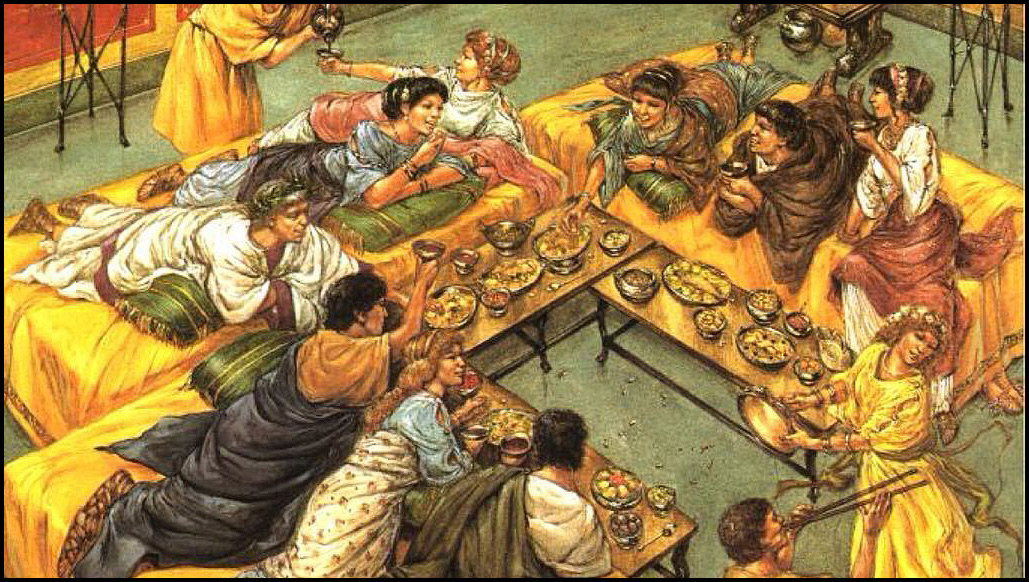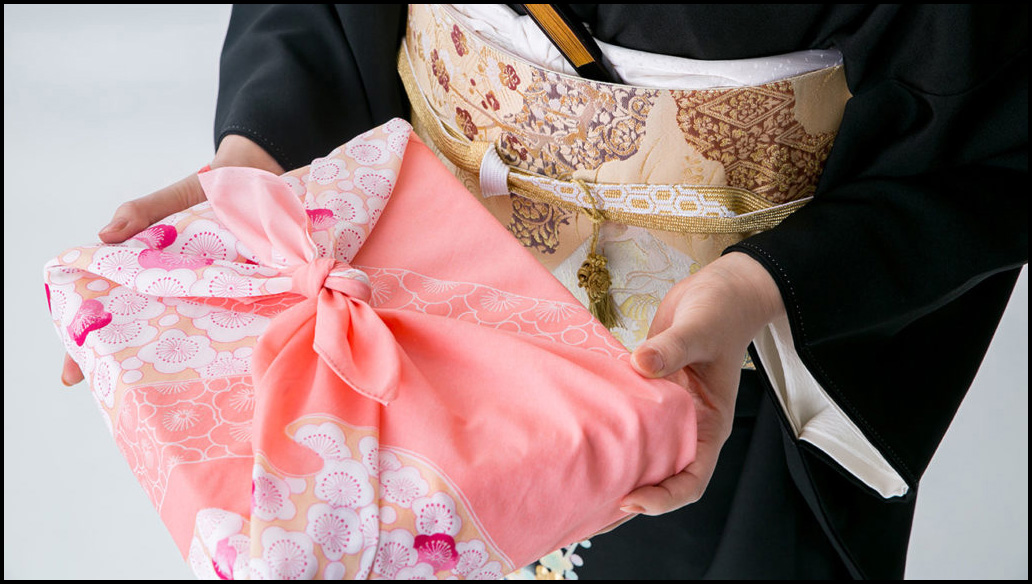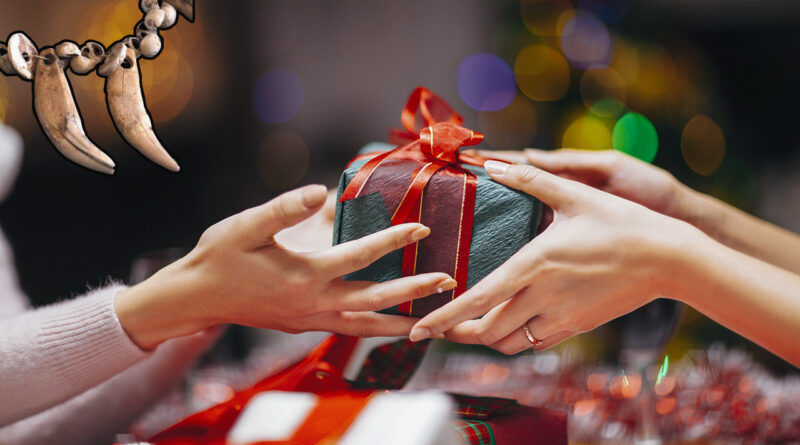A brief history of gifts: from apes and cavemen to St. Nicholas and modern Christmas
Gifts were trendy before it was cool.
There are countless reasons to present a gift to someone nowadays. But one of the most noticeable annual traditions are the gifts we share at Christmas and New Year holidays, before which. Some of you already pleased your close ones with the gifts, some still thinking what to choose maybe. And meanwhile, let us learn the brief history of gifts: how and why we decided and started to give them, how they differ around the world and how they have changed up to this day.
Gifts have been and remain an important expression of care and respect in all cultures and eras. From the stone age, in ancient Egypt and up to the present day. Gifts were presented to relatives, colleagues, army comrades, gods, kings and friends. Heck, even animals and our very remote mammal simblings do so.
Of course, for animals do that purely because of a sexual desire to win the “competition”. Yet, certain apes like bonobo seems to share food with even the members of other tribes, in order to expand the social structure of the group. This aspiration is native to most of the primates and is based on the need to preserve the flock. Strong social ties give a better chance of survival and prosperity. It is because of love and care that people value gifts too. It’s not just about getting something – it’s important to give as well.

Cavemen presented gifts to express their affection and gratitude to each other. Tribal leaders rewarded skilled tribe members for their achievements. Of course, the gifts of that time cannot be compared to modern ones: animal teeth, unique looking stone or even a piece of a bark, which could then be worn as an adornment.
Ancient Egypt: flowers, money, harvest & birthday parties.
Archaeologists have found much evidence of the gift of gifts in ancient Egypt: bowls, crests, amulets, jewelry, furniture. Most gifts were offered to Egyptian deities, although the priests were the actual lucky beneficiars who were actually receiving those.
The ancient Egyptians believed that even after the death of the body of the dead have a connection with both the afterlife and the real world. Therefore, the dead were always buried with various items that could be “useful” in the afterlife.

The pharaohs, who were supposed to become deities after the coronation, received honorary gifts on this day. Royal family was presented with jewelry, gold, flower grains and crops. This procedure , can be probably considered as one of the first birthday celebration traditions in history - as after the coronation, pharaoh was about to ascend or "reborn" as a god.
Ordinary people – such as merchants, farmers or traders, also participated in gift exchanges. In order to establish a new relationship or celebrate an important event, it was obligatory to present a valuable useful item. Its recipient also gave something equivalent in return.
Ancient Greece and the Roman Empire: gifts for everyone - even strangers.
The culture of Athens in ancient Greece, which we can learn about through literature and paintings is full with mentions of gifts.
Homer’s “Odyssey” emphasizes that the process if gifting is important to society. For instance, one of the sacred duties of the ancient Greeks was the principle of proxeny. It was a law of public hospitality – the oldest form of relations and international law in ancient Greece.
Giving gifts to strangers was considered a part of the public good, no matter whether it was tangible or intangible (for instance, a temporary shelter).

The ancient Romans were no strangers to giving gifts, especially during worships, such as Saturnalia. This annual holiday existed to honor of the god Saturn during the winter solstice. It was a time of massive banquets and alcohol consumption. At the feast, Romans gave small gifts to their family and friends. Some of these traditions later migrated to Christmas celebrations.
Islamic world - to support those who are less lucky in life.
The founder of Islam, the prophet Muhammad, spoke about the value of gifts.
An almsgiving and gifts, according to Islamic teaching, are manifestation of love and kindness. For Muslims, it is a blessed duty because it strengthens social ties.
One of the most common gifts that Muhammad gave and received was food – so such gifts became a strong tradition in Muslim culture.

During the three main Muslim holidays, people treat each other. During Ramadan, after the evening prayer, it is customary to fast with date fruits and water. On Ramadan, Muslims sacrifice grain and other basic products. On Eid al-Adha, they slaughter an animal and give a third of it to friends, and a third to someone else in need.
Medieval Europe and the origins of Santa Claus.

Medieval English monarchs Starting from Henry III in the 13th century and until the time of the Commonwealth, used the tradition of giving gifts at New Year. This was done so their subjects would them gifts in return as a form of taxation. Of course, not only because of the gifting spirit, people gave back - and this established a tradition.

One of the legends about Saint Nicholas tells that he secretly helped a bankrupted man who didn’t have enough money to provide his daughters dowries. Nicholas was dropping bags of gold through the chimney right into their stockings that were hanging by the fire to dry. Doesn't this look familiar?

The most known legend tells a story that during a terrible famine, a malicious butcher lured three little children into his house. He then killed them and placed their remains in a barrel to later sell them off as ham. Nicholas, while visiting the region to care for the hungry, saw through the butcher's lies and resurrected innocent kids. Since those times, Saint Nicholas is most known as the patron of children.

In Kievan Rus, our ancestors used to come to visit friends and relatives with a gift - a "treat". During the holidays and feasts people gifted cereals and flour as a symbol of prosperity. It also could be linen, textiles, clothes and shoes, blush, jewelry and other items as a sign of wealth. For both belly and soul!
Hinduism: the victory of light and nationwide joy.

Diwali, or "festival of light", is a 5-day festival annual holiday in India and one of the most popular festivals of Hinduism. Diwali symbolizes the spiritual "victory of light over darkness, good over evil, and knowledge over ignorance". Friends and relatives exchange gifts on the 4th day of the holiday, which reflect joy and splendor. Those include new clothes and jewels, gift hampers, flowers, gold and traditional Indian sweets.
Asian culture: it's all about process.

The Japanese culture since ancient times has formed a tradition of giving gifts on the occasion of ceremonial events. Such could be the birth of a child, weddings, and seasonal holidays. The way of exactly how the gift was presented, the words, the packaging - the gift-giving process in Japan is often more important than the gift itself.
In China, where the teachings of Confucius prevailed from the 5th century BC, gifts were meant to maintain harmony within a family and between friends. Gifts allowed subordinates to show their respect for elders and management, and were important to build business relationships. What is behind the gift (such as affection and admiration with which it was gifted) is also same important as its monetary value.
The tradition of love and care that came through centuries.
With time, somewhere during the 19th century, the emphasis on gifts in Europe shifted from early December or New Year to Christmas. This happened partly due to the Protestant Reformation in Northern Europe, which abandoned many celebrations.
The popularity of Santa Claus in North America also played its role. Stories about St. Nicholas were brought there by Dutch settlers, but later he became Santa Claus in the American style. The tradition of giving gifts on St. Nicholas Day shifted to Christmas Eve and later returned to Europe in this form. Though some families (like mine) can sometimes have a tradition to pleasure each other with gifts at all three holidays – St. Nicholas Day, Christmas and New Year.
The Christmas cards, btw, were invented in England during the Victorian era – thanks to the appearance of mail. It was a marketing ploy to encourage people to use it – and look how it turned out!
The history of gifts is as long as humanity itself. Gifts have been and remain an important part of the cultures and people all around the world. They are often more important even to the donors themselves than to those who receive the gift. And that’s not a surprise, because they often mean love, care or any kind of serious intentions – be it business or a romantic story.
While there are countless holidays and dates on which we are used to make gifts, nothing will ever stop us from showing our attention to others – because in return, it warms our own hearts all the same.
Articles used as a source: Hromadske, English Heritage, JoiGifts and of course, incredible Wikipedia. For more culture and lifestyle articles, look here. Merry Christmas and a happy incoming New Year, folks!

